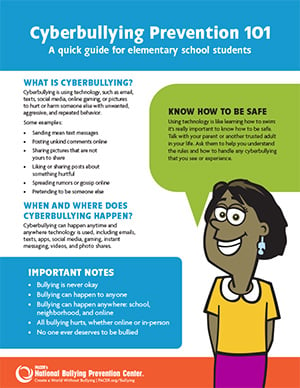In This Section
What is Cyberbullying?
Cyberbullying is using technology, such as email, texts, social media, online gaming, or pictures to hurt or harm someone else with unwanted, aggressive, and repeated behavior.
Some examples:
- Sending mean text messages
- Posting unkind comments online
- Sharing pictures that are not yours to share
- Liking or sharing posts about something hurtful
- Spreading rumors or gossip online
- Pretending to be someone else
Where and When Does Cyberbullying Happen?
Cyberbullying can happen anytime and anywhere technology is used, including emails, texts, apps, social media, gaming, instant messaging, videos, and photo shares.
Know How to be Safe
Using technology is like learning how to swim: it’s really important to know how to be safe. Talk with your parent or another trusted adult in your life. Ask them to help you understand the rules and how to handle any cyberbullying that you see or experience.
Important Notes
- Bullying is never okay
- Bullying can happen to anyone
- Bullying can happen anywhere: school, neighborhood, and online
- All bullying hurts, whether online or in-person
- No one ever deserves to be bullied
What You Can Do
If you are cyberbullied:
- now that you do not deserve what is happening
- Tell a grownup: your parents, a teacher, or trusted adult
- Develop a plan, with the help of an adult, about how to respond to the situation so that you feel safe
If you see cyberbullying:
- Tell the kid who is being bullied that they don’t deserve to be treated that way
- Help them tell a grownup, or report it to an adult yourself
- If you can, take a screenshot or photo, and share with a grownup
If you are the one cyberbullying:
- Stop any behavior that causes someone harm
- Understand that your actions are causing harm; it is NEVER okay to hurt someone
- Talk with a grownup. It might be hard, but let them know you messed up (we all do sometimes), and then find ways you can correct your actions
Telling An Adult is Important
How do you tell an adult about bullying? Try saying:
- “I think someone is cyberbullying… what do I do?”
- “I want to tell you about a text I got today, can we talk more?”
- “Somebody posted something that made me feel ___________ .”
(Sad • Hurt • Mad • Embarrassed • Worried • Scared)
Telling vs. Tattling
A lot of kids say that they don’t want to tell an adult about bullying because they don’t want to be called a tattletale. “Telling” is NOT “tattling” because telling is about getting help to protect yourself or someone else. Tattling is done to get someone in trouble.
Cyberbullying often happens in places without grownups. If an adult can’t see what’s happening, the only way they will know is if someone tells them. It’s important to report cyberbullying so that adults can help.
Download Cyberbullying 101 Handout

